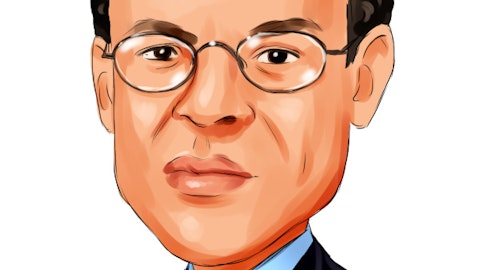Derik De Bruin: Great. And that was sort of my next follow-up on this one is like how closely are FDA and Fish and Wildlife working together? I mean, do they clearly understand the importance of what this is? And is there €“ did you get any sort of suggest an all-in timing on when this would be resolved or what the milestone we need to see?
Jim Foster: I mean, the timing is hard only because they’re pretty much consistent that we prove parentage. By the same token, Fish and Wildlife absolutely understand how these animals are used and the critical nature of them. I know that the various government agencies have been in conversation with one another on the outlook of the world through a different lens. But it’s going to be essential to move drug development forward for hundreds of clients and drugs that we have a resolution. So we’re off working on that. We’re off with an open dialogue with Fish and Wildlife about what exactly they need. And we have to explain to them that the reality of it’s going to take some time to get this up and running, but we’re well intentioned that we have deep science on our own.
We’ll collaborate with some others to get this up and running. And we’ll provide these tests, which €“ yes, that’s the basis of this whole situation to prevent wild animals being used in biomedical research.
Derik De Bruin: Thank you.
Jim Foster: Sure.
Operator: Thank you. Our next question will come from Eric Coldwell with Baird. Your line is open.
Eric Coldwell: Thanks very much. On the subpoena, are there any additional details you can provide on the timing of the receipt, what DOJ perhaps might think, they have come across that would drive this? And then can you confirm that the incremental margin on the rough $80 million to $160 million revenue headwind is about 50% to 60%? That’s what’s embedded in the guidance. And then third, could you talk about the supply expansion you’ve €“ to what extent you’ve been able to achieve supply expansion beyond Cambodia? Is there any additional detail you could €“ would be willing to provide on countries of origin, new suppliers, increases with existing non-Cambodian suppliers? Is there anything you can share to let us know what might be the ultimate outcome if, let’s say, worst-case scenario Cambodia doesn’t reopen?
Jim Foster: Sure. Subpoena is relatively recent, Eric. And we’re a subject here, meaning that they want to get information from us. Just to back up, that another Cambodian supplier was invited in November. That’s not somebody that we work with. And so we take a couple of our competitors to work with, and that started the whole questioning and to prove for the methodology. And so they are now looking at all of the suppliers in Cambodia, one of whom we get our monkeys from. We were just there and audited that, I guess, I should say, without sort of weighing in on what the government thinks. So doesn’t think that we believe it’s a professionally run operation from a veterinary point of view, from a nutritional point of view, from a housing point of view, from a shipment point of view.
And it’s a big farm. And they take our advice and counsel really well. So we feel that we have some end point and some auditing capability with them. We believe that as this DOJ investigation continues, we’re confident that they’ll conclude that any concerns they have with regard to Charles River are without merit. We don’t believe we did anything wrong. To the contrary, we always fully comply with U.S. and international laws. So we’ll work closely with them. We’ll be collaborative. We’ll be transparent. We will take the high road in terms of coming up with a solution that works for them, works for us and probably will work for other providers and competition, which is great. The supply thing is €“ I mean, it is what it is, Eric. It’s frustrating.





